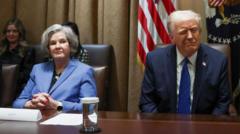President Trump's relationship with Japan is marked by a mix of praise and tariffs, as Japan negotiates for relief from new trade measures while navigating the complexities of U.S.-Japan ties.
Trump’s Tariff Policy: A Complex Relationship with Japan

Trump’s Tariff Policy: A Complex Relationship with Japan
The ongoing trade relationship between the U.S. and Japan reveals a juxtaposition of admiration, criticism, and negotiation amid tariff discussions.
In a recent announcement in the White House Rose Garden, President Donald Trump reflected on the legacy of former Japanese Prime Minister Shinzo Abe, who was tragically assassinated three years ago. Trump referred to Abe as a "fantastic man," a notable tribute amid the backdrop of his current trade policy that levies a significant 24 percent tariff on products imported from Japan. This duality of admiration and criticism characterizes Trump's dealings with Japan, a key U.S. ally.
The tariffs come as part of a broader initiative by Trump to renegotiate trade terms with a wide array of countries, and Japan finds itself in the unique position of being one of the first nations invited to discuss potential concessions. A negotiator assigned by Japan's current leadership is set to engage in talks with Treasury Secretary Scott Bessent, representative of an administration that has had mixed feelings towards its allies.
Throughout this process, Trump has openly acknowledged Japan's cultural significance and its role as a strategic partner, despite also voicing grievances over trade imbalances and security agreements. He remarked on the complex nature of their relationship by stating he "loves Japan," but highlighted anomalies within their bilateral security treaty — where the U.S. provides protection to Japan while Japan's defense commitments to the U.S. are viewed as lacking.
The upcoming negotiations reflect an essential balancing act for the Japanese government, striving to maintain its longstanding alliance with the U.S. while addressing the economic pressures of tariffs that could adversely affect its exports. As discussions unfold, observers will be looking for signs of how Japan will navigate the political landscape influenced by both Trump's temperament and the inherent dynamics of international trade.
This ongoing financial dialogue underscores the intricate and often contradictory nature of diplomatic engagements, where expressions of goodwill are juxtaposed with economic sanctions, shaping the future of U.S.-Japan relations.




















